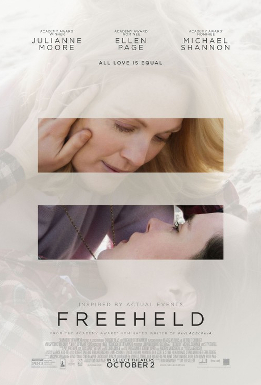Freeheld could have been one of the best movies of the year. A dynamic political drama that proved change was coming with one of the most complete casts we've seen in years. It nearly screams Oscar from its plot line alone. But somehow director Peter Sollett failed to find the story's heartbeat, wasting away an immense amount of talent and offering up a phoned in effort that misses the mark in nearly every capacity.
Centered around the love story between New Jersey police detective Laurel Hester and her domestic partner Stacie Andree, Freeheld was set to showcase the couple's fight to overturn a law that required pensions to only go to heterosexual spouses. But somehow, the film segwayed from a intense political battle into one of medicine as Hester finds herself fighting an uphill battle against stage four cancer.
Working hard to generate tears, Sollett works the system, utilizing heartfelt sentiment to create something that is so cliché and unapologetically glamorized that you can't help but feel as if you are being sold something. The dialogue is forced, the settings overly sentimental. You find yourself constantly staring at your watch, unable to fully immerse yourself into the story as none of the characters appear to offer up much more than a political agenda.
The film begins with Hester, a highly decorated detective who navigates the dangers of the job in an effort to bring a sense of safety to those who reside in her hometown of Ocean County, New Jersey. The immediate call to her service is an in-you- face approach that could have worked; however, before we know it the focus of the film switches as both her and Page's Andree are looking at buying a house. The oversimplification of their courtship (we see just a few dates) prevents us from digging deep into either character, leaving us with numerous questions as they venture into the local courthouse to apply for a domestic partnership license. While I understand the need for saving time, skipping over their growing admiration for each other doesn't do much to connect the audience with the characters, making Hester's cancer diagnosis similar to one that you'd read in the newspaper on Sunday after church. It has no real meaning as you aren't connected or curious as to either women's fate.
Granted, for what it's worth, both Moore and Page do a decent job with their characters, falling victim to terrible dialogue and hardly any depth. But the mountain the pair face proves too much. Instead of a groundbreaking tribute to a couple who fought for equality and won, audiences are forced to sit back and witness a film that casually exploits a course of action, forcing those who were forcing change to sit in near silence and serve as puppets to a bigger agenda.
We never get a strong fight; we never get much confrontation or a full understanding of the monumental climb Hester and Andree faced. Instead Sollett relies heavily on the audiences' perception of the subject matter, their understanding of the fight and their compassion towards those who become victims of such laws. There is no spark. There is no longing for change. And sadly, even with the often hilarious Steve Carell involved, there is no pulse. Moore deserves a lot of credit for her portrayal, but it simply isn't enough. This film was meant to be pure awards bait"¦and it goes to show you that even when all the parts are there, an effort has to be made to put them together correctly. For Freeheld, things just didn't pan out. And other than the highly energetic viewers who walk into the theater already loving the film and everything it stands for, this one is going to disappoint a lot of people.

